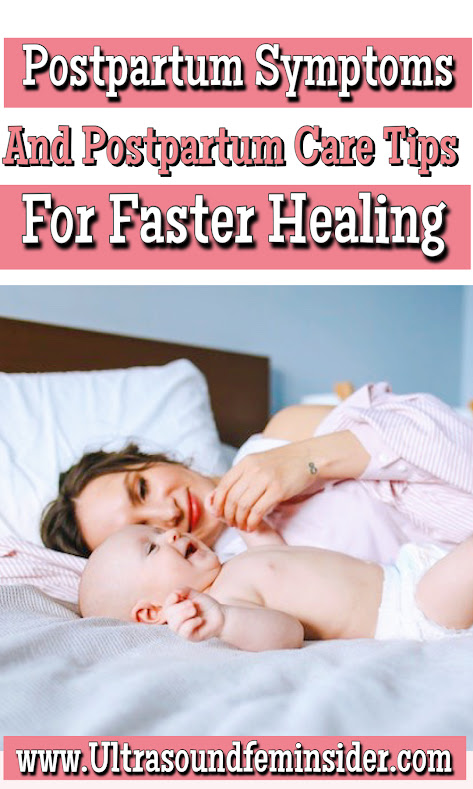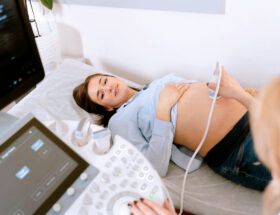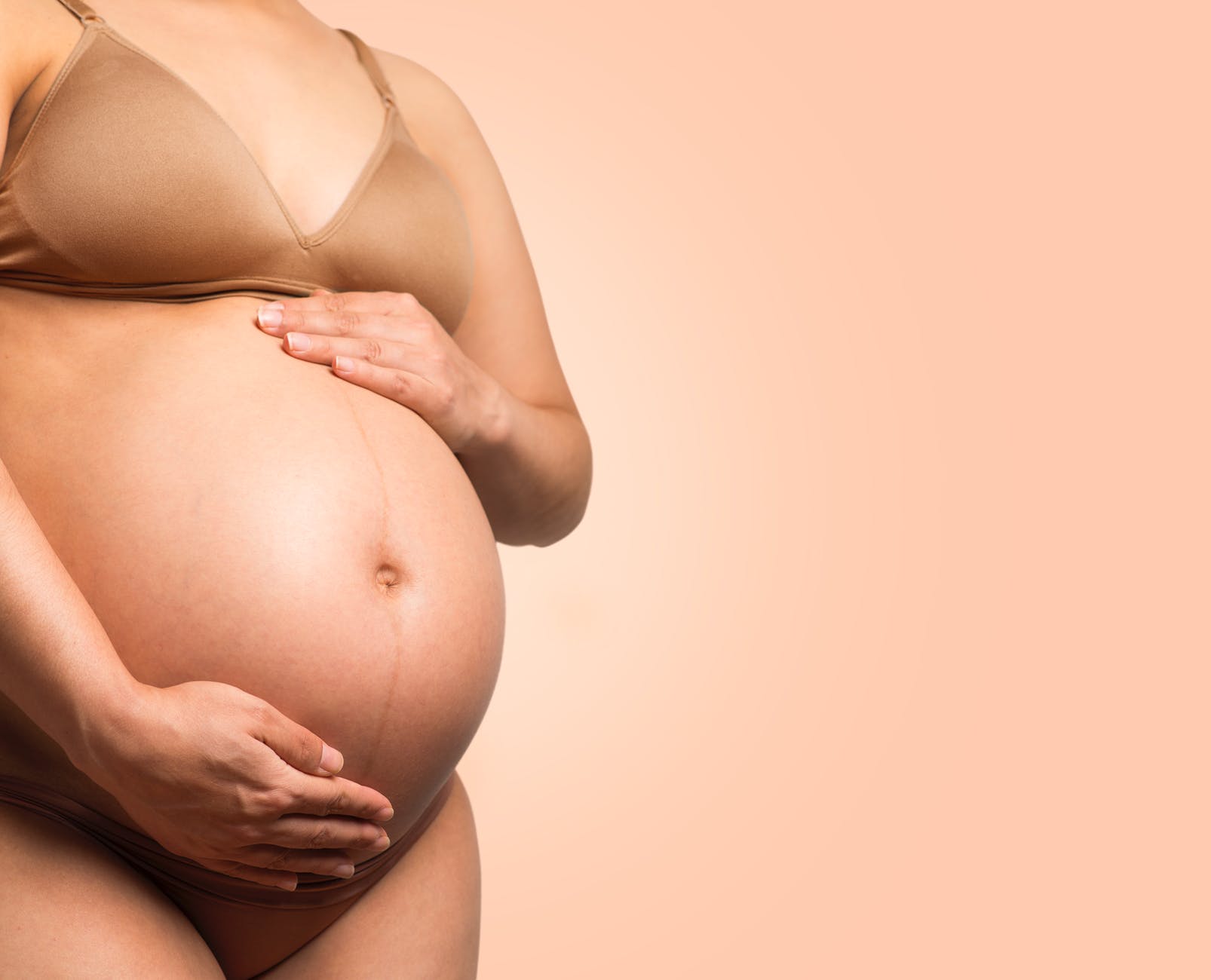There are many unexpected physical changes that take place in a woman’s body during pregnancy. However, this process does not end once the baby is born. Here is a rundown of what to expect after giving birth. In this article I am going to tell you everything you need to know about Normal Postpartum Symptoms and how to deal with them. This article will contain important Postpartum Care Tips as well to avoid complications. Ready? Let’s begin.
What are Normal Postpartum Symptoms?
The weeks immediately following delivery are a period of adjustment and recuperation for the new mother. You will need to make sure that you take care of yourself during those first few weeks after giving birth in order to have a successful recovery, regardless of whether you gave birth vaginally or through a C-section. Your body has been changing for the last 9 months, therefore during the postpartum period there is a lot of changes happening as well because your body has to go back to normal. The symptoms you can expect during the postpartum period are listed below:
Vaginal Bleeding or Discharge.
After giving birth, you will start to lose the superficial mucous membrane that lined your uterus. This will happen within a few days. For the next few weeks, you will have vaginal discharge that is made up of this membrane and blood. During the first few days, the discharge will be bright red and very heavy. The color will shift from a reddish brown to a yellowish white as it gradually fades away and becomes increasingly watery.
Helpful Tip: If you experience excessive vaginal bleeding that soaks a pad in less than an hour, you should contact your health care provider. This is especially important if the bleeding is accompanied by pelvic pain, a fever, or tenderness.
Urinary Incontinence.
Your pelvic floor muscles, which are responsible for providing support for the uterus, bladder, and rectum, are vulnerable to injury and stretching throughout pregnancy, labor, and a vaginal delivery. It is possible that you will pass a few droplets of pee as a result of this whenever you cough, sneeze, or laugh. These issues typically improve within a few weeks, but there is a chance that they will last for a longer time.
Helpful Tip: In the meantime, you may practice pelvic floor muscle exercises (also known as Kegels) and wear sanitary pads to assist tone your pelvic floor muscles and gain control of your bladder. To perform Kegel exercises, visualize yourself sitting on a marble and contract your pelvic muscles as if you were trying to pull the marble off of your seat. You should give it a shot for three seconds at a time, and then allow yourself to unwind for the count of three. At a minimum of three times each day, work your way up to performing the exercise ten to fifteen times in a row.
Uterine Contractions or Afterpains.
During the first few days following birth, it is possible that you will experience periodic contractions, also referred to as afterpains. Because they are similar to monthly pains, these contractions, which help prevent excessive bleeding by compressing the blood vessels in the uterus, frequently feel like menstrual cramps. Because breastfeeding causes oxytocin to be released into the body, nursing mothers frequently experience afterpains.
Helpful Tip: Your primary care doctor or another healthcare professional may suggest that you try an over-the-counter pain medication.
Hemorrhoids Discomfort or Bowel Irritation.
You may have enlarged veins in the anus or lower rectum if you have pain during bowel movements and feel swelling near your anus (hemorrhoids). To alleviate the discomfort caused by hemorrhoids while you are healing after a vaginal birth. These tips below are going to be very helpful:
Helpful Tips:
- Use a hemorrhoid cream or suppository that is available without a prescription and contains hydrocortisone.
- Use pads that contain witch hazel or a numbing ingredient to alleviate the pain.
- Soak your anal region in simple warm water for ten to fifteen minutes, two to three times a day, in order to relieve discomfort.
You should take measures to maintain your stools soft and regular if you notice that you are avoiding bowel movements out of concern of hurting your perineum or increasing the pain of hemorrhoids or your episiotomy incision. Consume meals that are high in fiber, such as fruits, vegetables, and grains that are whole, and drink plenty of water. If necessary, you should discuss the use of a stool softener with your primary care physician.
Tender breasts.
It’s possible that a few days after giving birth, your breasts will feel full, firm, and delicate (engorgement). It is recommended that mothers breastfeed often on both breasts in order to prevent or reduce engorgement. If your breasts are engorged, especially the black circles of skin that appear around the nipples, your infant may have difficulties latching on to your breasts.
Helpful Tip: Before feeding your baby, you could consider manually or using a breast pump to express a small amount of breast milk in order to assist your baby in latching on. Before breastfeeding or extracting breast milk with a pump, try applying warm washcloths or taking a warm shower to alleviate any discomfort in your breasts. It is possible that milk removal will become less difficult. Place cold washcloths on your breasts in the intervals between feedings. Pain medications that are available without a prescription should also be tried.
If you are not currently breastfeeding, you should wear a bra that offers support, such as a sports bra. Do not express the milk or pump your breasts because doing so will stimulate the production of additional milk by your breasts.
You can share this article by clicking the image below.

Hormonal Mood Changes.
The process of giving birth brings up a whole range of intense feelings. The term “baby blues” refers to the period of time during which many new mothers suffer a period of feeling depressed or nervous. Mood swings, weeping bouts, worry, and trouble sleeping are some of the symptoms of this condition. In most cases, the baby blues go away within the first two weeks.
Helpful Tip: In the meantime, make sure you’re taking care of yourself properly. Talk to your partner, loved ones, or close friends about how you’re feeling, and ask for their assistance.
You may be suffering from postpartum depression if, in the weeks immediately following the delivery of your child, you experience extreme mood fluctuations, loss of appetite, excessive weariness, and a lack of joy in life. If you believe you might be sad, talk to your doctor, especially if your symptoms don’t go away on their own, if you’re having problems caring for your baby or completing daily duties, or if you’re having thoughts of hurting yourself or your baby.
Skin Changes and Hair Loss.
Because of the increased quantities of hormones that occur during pregnancy, your hair will grow more quickly than it will shed. The end result is frequently an exceptionally full head of hair, but the time has come for retribution. Following the delivery of your baby, you may have hair loss for a period of up to five months.
Even after delivery, stretch marks won’t go away entirely, but over time, their color will change from red to silver. You can anticipate that any areas of your skin that became darker during pregnancy, such as dark patches on your face, will also gradually fade away.
Helpful Tip: For skin changes and hair loss you can blame hormonal changes after pregnancy. These hormonal changes will pass in a few weeks. To help your body you can take prenatal vitamins and maintain a balanced diet rich in nutrients and stay hydrated.
The Anticipated Weight Loss.
It’s possible that after you give birth, people will think you’re still pregnant. This is to be expected. The typical postpartum weight loss for women is approximately 13 pounds (6 kilograms), which includes the weight of the baby, the placenta, and the amniotic fluid. In the days after birth, you will continue to lose weight due to the residual fluids in your body. After that, maintaining a balanced diet and engaging in regular physical activity can assist you in gradually returning to the weight you were at before you became pregnant.
Tips to Keep in Mind for Postpartum Care.
- Getting more rest: Since laboring and giving birth to a child is strenuous work, it’s likely that you didn’t get much rest while you were in the hospital. During the first few weeks following delivery, it is essential for you to get as much rest as possible whenever you can. Make an effort to get some sleep or rest while your baby is napping. Your health will improve as a result of this rest.
- Avoiding heavy lifting: While you are still in the process of recuperating, you should avoid lifting anything that is heavier than your infant. If you have recently given birth via cesarean section, this is of utmost significance.
- Handwashing: Although it may appear to be a trivial matter, it is imperative that you wash your hands frequently. Always remember to wash your hands before you feed your baby, after you use the restroom, and before you change your baby’s diaper.
- Climbing stairs less frequently: During the first week of your exercise program, you should make an effort to climb stairs less frequently than usual. While you are recovering, you should make an effort to reduce the number of times you climb and descend the stairs each day.
- Keeping the care of your newborn simple: It can be challenging enough to figure out your newborn’s routine and requirements in the first few weeks of their life; you don’t need more on your plate when it comes to meeting your baby’s requirements. Your infant does not require a bath on a daily basis. Instead, you should make use of wet wipes to ensure that the face, hands, and diaper area of your infant are clean on a daily basis.
Postpartum Care Tips.
- You should hold off having sexual contact until after you’ve had your first checkup appointment. After having birth, your body needs time to repair, and part of the healing process is waiting a few weeks before engaging in sexual activity again. When your perineum has healed or the abdominal scar from your C-section has healed, as well as when your postpartum bleeding and discharge is minimal, your provider will let you know that it is safe to have sex again.
- Having a conversation about birth control. It is possible that the idea of becoming pregnant again so soon after giving birth would sound unusual to you, especially if you haven’t started getting your period again yet. But that is not a problem at all. In many cases, your healthcare professional will discuss possible methods of birth control with you before the birth of your child. During your initial appointment for a check-up, if you haven’t done so already, discuss this matter with your healthcare provider. Even though you might not have your periods while breastfeeding, there is still a chance that you could become pregnant.
- During the first two weeks after giving birth, you should avoid douching and wearing tampons. During the first four to six weeks following delivery, you shouldn’t put a tampon or douche on your vaginal opening. The most secure approach is to use pads to collect any blood or discharge that may occur.
- You should not stop taking your prenatal vitamins at any point during your pregnancy.
- Consume balanced meals. During the first few weeks after giving birth, it is essential to consume a large quantity of nutritious foods. Your speedy recovery will be aided by eating well. Aside from that, it is strongly suggested that you abstain from drinking alcohol and staying away from caffeine throughout this period.
- Every day, you should consume the equivalent of eight full glasses of fluid to stay hydrated.
- Take a walk. It is healthy to go out of the house to do some little exercise. To ease back into physical activity after giving birth, walking is an excellent option. Have a conversation with your healthcare physician about when it is OK for you to begin a new fitness program and how much activity you are able to participate in at one time.
Related Posts you might want to read!
C-Section Recovery Tips to Heal Faster.
Postpartum depression. Causes, symptoms and prevention.
How to Get Rid of Loose Skin After Pregnancy Without Surgery.
Final Thoughts about Normal Postpartum Symptoms. Postpartum Care Tips.
After giving birth, you might believe that you can immediately get back to living your life normally. However, during this period in your life, you will have a lot of adjustments to make in order to adapt to life with a newborn, and you will also be recovering. It is essential to keep in mind that giving birth is something that your body will need to heal from over the course of time. Your body will require time to recover after giving birth, regardless of whether you had a vaginal delivery or a C-section.
Zadi, xo
Disclaimer: The medical information on this post is for educational and entertainment use only. Under no circumstances, this information is to replace your doctor’s advice or to treat any disease. For proper care, always visit your doctor.









